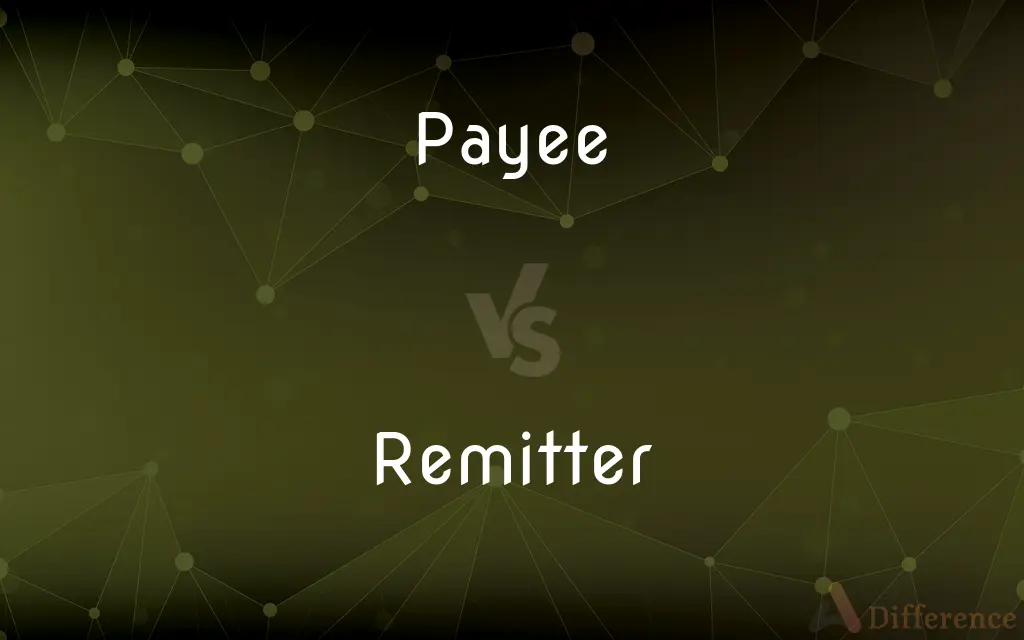Payee vs. Remitter — What's the Difference?
Edited by Tayyaba Rehman — By Maham Liaqat — Updated on April 25, 2024
A payee receives money in a transaction, focusing on the endpoint of the payment process, whereas a remitter is the party who initiates and sends the payment, emphasizing the start of the transaction flow.

Difference Between Payee and Remitter
Table of Contents
ADVERTISEMENT
Key Differences
A payee is the recipient in a financial transaction, typically the one who benefits from the payment. On the other hand, a remitter is the individual or entity that sends the payment, often acting on a pre-existing obligation to transfer funds.
The role of a payee is to receive funds, which might be for services rendered, products sold, or other financial entitlements. Whereas the remitter must ensure the funds are sent correctly and reach the intended recipient, handling the logistics of the payment method.
In the context of banking and finance, the payee is entered as the beneficiary on payment forms or online transactions, identifying whom the money should go to. On the other hand, the remitter's information is used to track who made the payment and to ensure accountability and transparency.
For legal and tax purposes, the payee may have to report receipts as income depending on the context of the transaction, whereas the remitter might record the payment as an expense or a reduction in liabilities.
In practical scenarios, the payee waits to receive the funds to confirm the completion of a transaction, focusing on the end result of the payment process. Conversely, the remitter initiates the transaction and may need to follow up to confirm the successful transfer of funds.
ADVERTISEMENT
Comparison Chart
Role in Transaction
Receives payment
Sends payment
Main Responsibility
To verify receipt of funds
To ensure correct dispatch of funds
Financial Reporting
May record incoming payments as income
May record outgoings as expenses
Involvement in Process
Passive recipient
Active initiator
Legal Obligations
Declare receipts for tax purposes
Track payments for accountability
Compare with Definitions
Payee
Individual or entity that receives money in a transaction.
The store was the payee when John bought his new laptop.
Remitter
Individual who initiates a payment process in banking.
The customer became the remitter when he set up automatic bank transfers.
Payee
The beneficiary in various forms of financial documents.
On the insurance claim, Sarah was listed as the payee.
Remitter
Party responsible for dispatching funds to settle an obligation.
The tenant is the remitter of rental payments.
Payee
The ultimate recipient in a series of financial transactions.
The landlord is the payee when tenants pay their rent.
Remitter
The originator of a wire transfer or electronic payment.
The company acts as the remitter when it pays overseas suppliers.
Payee
Receiver of funds in a check or electronic transfer.
The charity became the payee once the donation was processed.
Remitter
Sender of a check or money order.
Helen was the remitter on the money order sent for the application fee.
Payee
Entity to whom money is owed and payable.
In the contract, the contractor is specified as the payee upon completion.
Remitter
Person or entity that sends a payment.
Jason was the remitter when he paid his credit card bill online.
Payee
The person to whom money is to be, or has been, paid; the person named in a bill or note, to whom, or to whose order, the amount is promised or directed to be paid. See Bill of exchange, under Bill.
Remitter
To transmit (money) in payment.
Payee
One to whom money is paid.
Remitter
To refrain from exacting (a tax or penalty, for example); cancel.
Payee
One to whom money is paid.
Remitter
To pardon; forgive
Remitted their sins.
Payee
A person to whom money is paid
Remitter
To restore to a former condition or position.
Remitter
To refer (a case) to another court for further consideration or action.
Remitter
To refer (a matter) to a committee or authority for decision.
Remitter
To allow to slacken
The storm remitted its fury.
Remitter
To transmit money.
Remitter
To diminish; abate
The symptoms of the disease remitted.
Remitter
A matter remitted for further consideration.
Remitter
Chiefly British An area of responsibility; scope.
Remitter
One who remits, or makes remittance.
Remitter
One who pardons.
Remitter
(legal) The sending or placing back of a person to a title or right formerly held; the restitution of one who obtains possession of property under a defective title, to his rights under some valid title by virtue of which he might legally have entered into possession only by suit
Remitter
One who remits.
Remitter
The sending or placing back of a person to a title or right he had before; the restitution of one who obtains possession of property under a defective title, to his rights under some valid title by virtue of which he might legally have entered into possession only by suit.
Common Curiosities
Is a payee always an individual?
No, a payee can be an individual, a business, or any other entity that is supposed to receive money.
What information is needed for a remitter in a transaction?
The remitter's account details and identity information are needed to initiate a payment.
Why is it important to distinguish between a payee and a remitter?
Understanding the roles helps in managing financial transactions and legal obligations effectively.
Who is a remitter?
A remitter is the individual or entity that initiates and sends a payment.
Can one be both a payee and a remitter?
Yes, an individual or entity can act as both a payee and a remitter in different transactions.
What responsibilities does a payee have?
A payee needs to verify the receipt of funds and maintain records for legal and financial purposes.
What is a payee?
A payee is the recipient of funds in a transaction.
How does a remitter confirm a transaction has been completed?
A remitter can confirm a transaction through receipts, transaction status updates, or bank statements.
What happens if a remitter sends money to the wrong payee?
The remitter must contact their bank or payment service to attempt to retrieve the funds.
What forms of payment can a remitter use?
A remitter can use checks, electronic transfers, wire payments, and other forms of digital payment.
What is the difference between a payee and a beneficiary?
While similar, a beneficiary often refers to someone who receives benefits under specific conditions, such as from insurance or a will.
Can a remitter cancel a transaction?
Yes, a remitter can often cancel a transaction if it has not yet been fully processed.
Do payees have to pay taxes on received funds?
It depends on the context, but generally, payees might have to declare received funds as income.
How are disputes between payees and remitters resolved?
Disputes can be resolved through direct negotiation, mediation, or legal action, depending on the severity of the issue.
Can a payee reject a payment?
Yes, a payee can reject a payment if it does not meet the terms of the agreement or is otherwise unsatisfactory.
Share Your Discovery

Previous Comparison
Bliss vs. Fear
Next Comparison
Conservationist vs. EnvironmentalistAuthor Spotlight
Written by
Maham LiaqatEdited by
Tayyaba RehmanTayyaba Rehman is a distinguished writer, currently serving as a primary contributor to askdifference.com. As a researcher in semantics and etymology, Tayyaba's passion for the complexity of languages and their distinctions has found a perfect home on the platform. Tayyaba delves into the intricacies of language, distinguishing between commonly confused words and phrases, thereby providing clarity for readers worldwide.














































